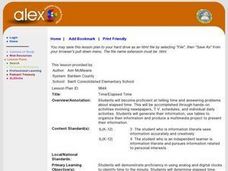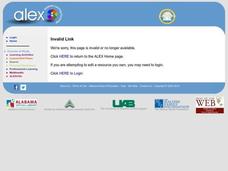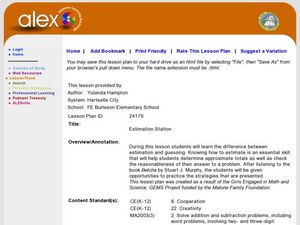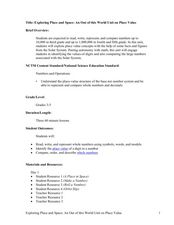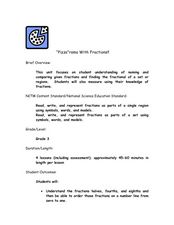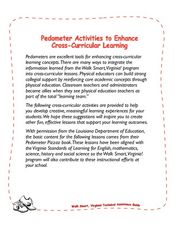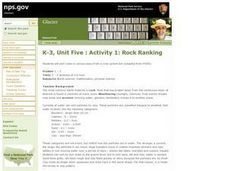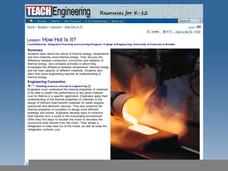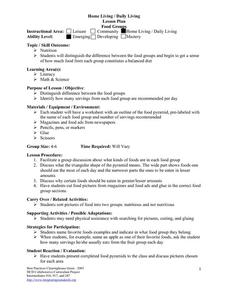Curated OER
Time/Elapsed Time
Young mathematicians complete various activities to demonstrate proficiency in telling time and identifying elapsed time. They analyze and discuss television schedules, create a booklet about their daily activities, produce a TV. guide,...
Alabama Learning Exchange
Time to Tell Time
Students demonstrate how to tell time using an analog clock. In this time measurement lesson, students read the book Clocks and More Clocks and use analog clocks to demonstrate the time that the teacher called out.
Alabama Learning Exchange
Understanding Fractions
Young learners explore fractions and demonstrate parts of a whole by using a candy bar and a piece of paper and dividing both into equal parts. Included is a worksheet that requires youngsters to color in half of each polygon shape. Some...
Alabama Learning Exchange
Estimation Station: Why Estimating is Better than Guessing
Youngsters discover the difference between estimating and guessing. They estimate how many items are contained in a jar as they read a story. After the story, pupils discover the differences between estimating and guessing and create a...
Alabama Learning Exchange
Ice Cream Sundae Survey
Young scholars analyze data through graphs. They will complete a class survey on ice cream sundaes and tally and graph the responses. They then analyze the information from the class graph.
Alabama Learning Exchange
Straight Line Motion
Students examine gravity, mass, and friction. In this speed and motion instructional activity, students investigate how straight line motion is impacted by gravity, mass, and fiction as they participate in a hands-on activity.
Alabama Learning Exchange
Dog Gone Again!
Here is a real-life lesson plan! Learners must plan the dimensions of a rectangular fence to reign in a runaway dog. They survey what shape and size fence is needed and use formulas to find perimeter and area of the fence. They explore...
Alabama Learning Exchange
Twisted Tangrams
Primary geometers create a picture using tangrams. In this geometry lesson, students read Grandfather Tang: A Tale Told with Tangrams, cut out their own tangrams, and choose a character from the story to make using their tangram pieces.
Curated OER
Let's Make A Deal
Third graders make a picture money book. In this money lesson, 3rd graders read The Monster Money Book, discuss money terminology, watch a video on money and draw an example of the barter system. Students use the Internet to find...
Curated OER
Water Pressure Blaster
Third graders complete an experiment to introduce them to the concept of water pressure. In this water pressure lesson plan, 3rd graders create pressure in a water bottle and observe the force of water that is created.
Curated OER
Cloudy with a Chance of Meatballs
Students explore the 5 themes of geography. In this cross curriculum literacy and geography lesson, students listen to Cloudy with a Chance of Meatballs by Judi Barrett, and make a list of the needs of the people in Chewandswallow....
Curated OER
The Very Hungry Caterpillar
Read the story, The Very Hungry Caterpillar, and complete activities from multiple subjects. Make a mural, create a class graph, discuss the life cycle of a butterfly, research information about butterflies on the Internet and make...
Curated OER
Flight Dreams - Folding into Flight
Combine measurement, following directions, physics, and art with one fun activity. Learners read a set of instruction to create three different kinds of paper airplanes. They measure, fold, and fly the planes, and record data and answer...
Curated OER
Exploring Place and Space
Students explore number values by completing mathematical worksheets in class. For this decimals lesson, students identify the different place values a number has and the use of decimals to represent a fraction of a number. Students...
Curated OER
"Pizza"rama With Fractions!!
Young mathematicians explore number values by utilizing food as a visual aide. They discuss the differences between halves, fourths, and eighths and how they are visually represented by a pizza. Then create their own pizza in class and...
Curated OER
Pedometer Activities to Enhance Cross-curricular Learning
Young scholars complete different activities involving pedometers such as writing a creative story, calculating step averages, researching pedometers, calculating calories, and much more.
National Park Service
Rock Ranking
Junior geologists sort rocks and soil. They separate a sample of river gravel by size, shape, color, and other characteristics. To include Common Core standards, you could have little ones graph the number of particles in each sample.
Curated OER
Patterns of Communication
Scholars examine codes, symbols, and other forms of communication. They discuss Morse Code. Next, they are given messages written in code, which they must decipher.
Curated OER
Tracking the Salt Front
Using the Hudson River as the focus, learners discuss the difference between salt water and fresh water environments, analyze maps and graphs, and complete addition and subtraction problems. This lesson comes with a wealth of...
Curated OER
A Handy Measure
How many hands tall are you? Challenge kids to measure themselves the way the 19th century Oklahoma horse traders measured their prize horses (can they guess how many hands tall a horse had to be?). There's some background information...
Teach Engineering
How Hot is Hot?
Elementary schoolers identify the three methods of heat transfer: conduction, convection, and radiation. The lesson is mostly lecture-based. When the teacher has finished the presentation, groups of pupils get into teams and they must...
Curated OER
Home Living/ Daily Living: Food Pyramid
What did you have for lunch? Did it contain all four food groups? Help your special education class make good food choices and recognize foods in each of the four food groups. They look at images and discuss the foods on the food pyramid...
Curated OER
Home Living/ Daily Living: Food Groups
What are the best foods to eat, and how much is too much? Kids discuss the importance of eating the right amount of each of the four food groups. They discuss the food pyramid and make meals by cutting and pasting foods from a magazine...
Computer Science Unplugged
Lightest and Heaviest—Sorting Algorithms
How do computers sort data lists? Using eight unknown weights and a balance scale, groups determine the order of the weights from lightest to heaviest. A second worksheet provides the groups with other methods to order the weights. The...
Other popular searches
- Math and Science
- Math and Science Careers
- Integrated Math and Science
- Science/ Math Games
- Math and Science Activities
- Integrating Math and Science
- +Math and Science Careers
- Math and Science Plan
- Math in Science
- Math Science
- Math and Science Lessons
- Math and Forensic Science
